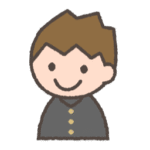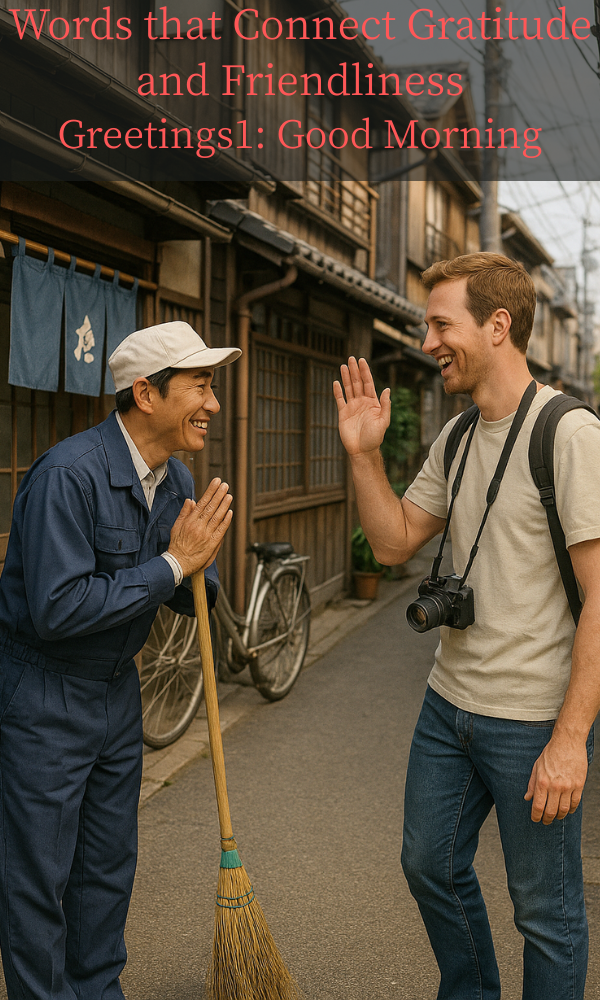
This article is
・Those who want to know what kind of person I am.
・Want to know what this blog is all about?
That’s what this article is about.
The previous article described the differences between Japan and other countries and their cultural backgrounds.
Here, I define this part’s greeting 1.
I will focus on the most common everyday conversations, such as “Ohayou gozaimasu”, “Konnichiha”, “konbanha”, “Oyasumi nasai”.
Index
Greetings1 Conclusion
It is said that Japanese people use more greetings than other countries.
In other words, greetings are the bare minimum of courtesy and are the best tool for shortening the distance between you and Japanese people.
And greeting timing is very sensitive.
If you want to know Japan and the Japanese, let’s learn basic Japanese greetings first.
Good Morning- おはよう”Ohayou” / おはようございます”Ohayou Gozaimasu”
When to use: In the morning, when greeting someone.
Explanation:
Casual: おはよう “Ohayou”
Polite: おはようございます “Ohayou gozaimasu”
Question and Answer
Q: Why do good Morning have two Expressions?
A: Common theory,
The morning greeting “Ohayou gozaimasu ‘Good morning'” is said to have its origin in kabuki.
Kabuki actors took a long time to prepare for a performance, so they would arrive long before the performance began to get ready.
In response, the backstage and lower-ranking staff members used the phrase “お早いお着きでございます’Ohayai otuki de gozaimasu’” to express their gratitude, and the phrase changed to its current form.
e.g., you have arrived early “お早いお着きでございます’Ohayai otuki de gozaimasu'”
Foreigners’ Reactions Based on Actual Experience
I think you can learn more about Japanese greetings from what I experienced before and from the experiences I heard from friends.
“Why do Japanese People say ‘Ohayou’ at Night?”
When my American friend Tom started working at a Japanese language school, he was confused on his first evening shift.
It was 6:30 PM, and he greeted everyone with

Good evening!
But everyone responded cheerfully with

Ohayou gozaimasu!
He looked at me and whispered,

Did I mess up? Isn’t it already night?
I smiled and said,

In Japan, “Ohayou gozaimasu” isn’t only for the morning. It’s used when you begin work or enter a group, no matter the time. It’s like saying, ‘Hi, I’m here!’
He laughed and said,

That’s pretty cool. It makes every work shift feel like a fresh start.
After that, he started saying “Good morning!” properly even at night.
This testimonial will give you this information
“おはようございます” is a morning greeting.
But in some situations, it is correct to say “おはようございます” at a different time.
That is when you are starting something, for example.
Greetings1 Conclusion again
Today’s topic is the most basic conversation, ohayou gozaimasu.
When you read the next article, you may be wondering, Do Japanese people greet people in this way? You might think so.
It is important for Japanese people to greet each other on a regular basis.
Therefore, I recommend that you first learn Japanese greetings before coming to Japan.
In this case, the most basic greetings, such as “Ohayou gozaimasu” were explained.
Next, I will introduce the noon greeting, konnichiha!
Please look forward to it.
Links to each part are provided.
Cultural Differences, Hello, Good evening, Good night
P.S.
Good morning is a good word, isn’t it?
I always greet my neighbors with good morning too. This is because I believe it is not only a greeting, but also a way to give them a smile.
Follow us and you won’t miss any blog updates.
またね(Matane)!



コメント